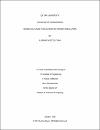Modeling Family Behaviors in Crowd Simulation
Abstract
Modeling human behavior for a general situation is difficult, if not impossible. Crowd simulation represents one of the approaches most commonly used to model such behavior. It is mainly concerned with modeling the different human structures incorporated in a crowd. These structures could comprise individuals, groups, friends, and families. Various instances of these structures and their corresponding behaviors are modeled to predict crowd responses under certain circumstances and to subsequently improve event management, facility and emergency planning.
Most currently existing modeled behaviors are concerned with depicting individuals as autonomous agents or groups of agents in certain environments. This research focuses on providing structural and state-based behavioral models for the concept of a family incorporated in the crowd. The structural model defines parents, teenagers, children, and elderly as members of the family. It also draws on the associated interrelationships and the rules that govern them. The behavioral model of the family encompasses a number of behavioral models associated with the triggering of certain well-known activities that correspond to the family’s situation. For instance, in normal cases, a family member(s) may be hungry, bored, or tired, may need a restroom, etc. In an emergency case, a family may experience the loss of a family member(s), the need to assist in safe evacuation, etc. Activities that such cases trigger include splitting, joining, carrying children, looking for family member(s), or waiting for them. The proposed family model is implemented on top of the RVO2 library that is using agent-based approach in crowd simulation. Simulation case studies are developed to answer research questions related to various family evacuation approaches in emergency situations.
DOI/handle
http://hdl.handle.net/10576/5362Collections
- Computing [112 items ]


